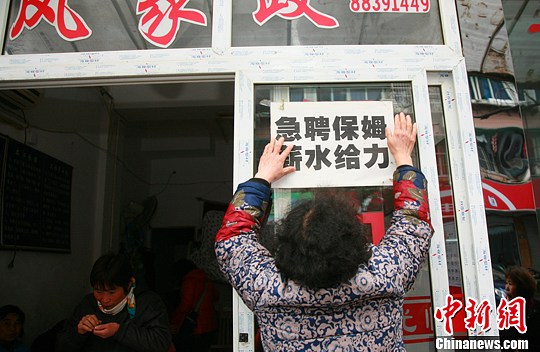China News Service, June 11, according to news from the Ministry of Commerce website, the Ministry of Commerce, the Ministry of Human Resources and Social Security, the Poverty Alleviation Office of the State Council and other ten departments jointly issued the "Notice on Consolidating and Expanding the Poverty Alleviation Work of Home Economics" (hereinafter referred to as "Notice"). According to the notice, in 2020, localities can increase their financial support for small and medium-sized micro-domestic enterprises that do not lay off workers or reduce layoffs according to the balance of the unemployment insurance fund.
Information figure: The person in charge of a housekeeping company posted a recruitment slogan at the door. China News Service issued Li Chenyun photo
The notice pointed out that in strengthening policy support, it is necessary to promote the implementation of the policies that have been introduced to take effect. All localities should accelerate the implementation of financial, financial, housing, training and other policies that promote the quality and expansion of domestic service, strengthen policy publicity, produce policy application guides and related videos, and guide enterprises through associations and other channels to make good use of them. Various policies.
Secondly, we must build a labor export base. Use various skills training base policies to support the construction of domestic service export bases. Instruct all bases to use training packages for old-age and child care, and carry out standardized and standardized skills training. The Ministry of Commerce will coordinate with relevant United Nations agencies to study and formulate training outlines in key areas such as home care and childcare, and support training courses for home economic labor export bases with better basic conditions. Local human resources and social security departments should strengthen the construction of a demonstration base for vocational training in domestic service, increase investment, and improve training capabilities.
The notice also stated that financial support should be increased. Use budgetary investment subsidies to support the construction of community convenience service outlets such as housekeeping. All regions can use special account funds for vocational skills improvement actions and poverty alleviation funds to subsidize the training of poor laborers engaged in domestic service. A domestic employment enterprise that preferentially recruits poor labor is given a one-time employment subsidy. If the poor labor force is organized to be employed outside the county where the household registration is located, a one-time job search and entrepreneurship subsidy shall be provided in accordance with regulations. During the epidemic prevention and control period, poor laborers who go out to engage in housekeeping services will be given subsidies for transportation and living expenses in accordance with regulations.
At the same time, financial policies must be improved. Support the connection between poverty-stricken domestic business enterprises and financial institutions, and implement the financial support measures determined by the State Council for the resumption of production of small, medium and micro enterprises. Support the information sharing of the housekeeping service credit information platform with banks and other financial institutions, and guide and encourage financial institutions to provide unsecured and unsecured credit loans to well-qualified and qualified housekeeping enterprises. The poverty-stricken population with the willingness to engage in housekeeping services and entrepreneurship in the field of housekeeping services can be included in the poverty alleviation policies including poverty alleviation and micro-credit loans.
The notice stated that the credit system for domestic service should be improved. Make good use of the issued central service industry development funds, where conditions permit, to support poor laborers engaged in housekeeping services to return to work. Guide housekeeping enterprises to automatically record the online training content of housekeeping attendants into the housekeeping service credit information platform, establish standard and complete housekeeping attendant credit records in accordance with laws and regulations, and provide consumers with relevant guarantees for preferential selection of the above service attendants.
The notice also emphasized the need to strengthen insurance support. Encourage commercial insurance institutions to cooperate with competent commercial authorities to develop commercial insurance products tailored to the needs of domestic service. Areas with conditions can provide subsidies to domestic business enterprises and domestic service workers who purchase commercial insurance.

